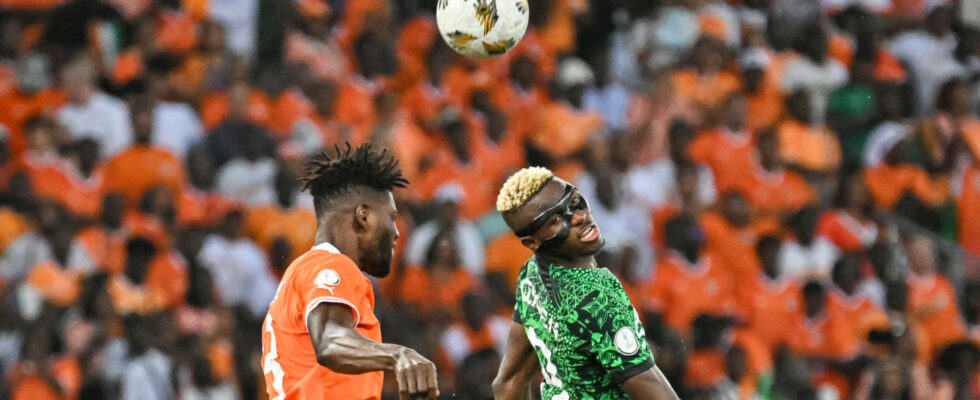Cyrille de La Morinerie, with AFP // Credits: SIA KAMBOU / AFP
modified to
2:01 p.m., February 12, 2024
Ivory Coast, after coming close to elimination in the group stage, won the third African Cup in its history by beating Nigeria 2-1 in the final on Sunday in front of its home crowd at the Alassane Ouattara stadium in Abidjan.
The Super Eagles opened the scoring in the first half when William Troost-Ekong headed the ball into the Ivorian goal from their first corner (38th). But the Elephants equalized in the second half with Franck Kessié’s header at the far post on a cross from Simon Adingra (62nd), then took the lead through Sebastien Haller who cut the trajectory of the ball at the near post on a cross from ‘Adingra (81st). Both crosses came from Simon Adingra.
There remained in this team something of the “resurrected”: this way of resisting headwinds, since Nigeria had opened the score against the run of play with a header from captain William Troost-Ekong (32), on one of the Super Eagles’ rare first-half incursions into the opposing camp. They forged it along a trajectory that will go down in the history of football.
Almost eliminated after the slap against Equatorial Guinea (4-0), last drafted in the first round, passed on penalties against Senegal (1-1, 5 tab to 4) then ten against eleven against Mali (2 -1 ap), with each time goals in the last moments, the Ivorians were finally masters of their subject only in the half against the DR Congo (1-0). In the final, they always looked to play and never got discouraged. Max-Alain Gradel saw Calvin Bassey on his knees deflect his dangerous shot (50th), Odilon Kossounou forced Stanley Nwabali into a cuff (62nd).
Emerse Faé crowned in four matches
It was from this corner that Simon Adingra’s cross came for the equalizer. And there, the match changed its appearance. Nigeria could no longer even counter. The Ivory Coast dominated even more, and Haller thought he scored on a return (74th). This perseverance in the game is Emerse Faé’s victory. The 40-year-old coach has made a mammoth start to his coaching career, African champion after four matches as number one, after replacing Jean-Louis Gasset the day after this disastrous first round.
His choices paid off, he revived the former Jean-Michaël Séri, Max-Alain Gradel and Serge Aurier. The last two won their second personal African Cup after that of 2015. A host country won for the first time since Egypt in 2006, against… Ivory Coast (0-0, 4 tab to 2). And Ivory Coast finally scored for the first time in five CAN finals. She finished the first four 0-0, winning two (1992 and 2015) and losing as many (2006, 2012) on penalties.
Sébastien Haller, who arrived injured, who had not played a single minute of the first round, ended the tournament like a cannonball, one goal in the half, one goal in the final. Extraordinary for a player who survived testicular cancer who had not scored against professionals for six months, in all competitions, only a double against amateurs in the German Cup with Dortmund! Victor Osimhen on the other hand is inconsolable, his sacred mission stops at the last stage.
He dreamed of guiding the Super Eagles to the title and joining Jay-Jay Okocha and Nwankwo Kanu, his idols, his models, in the legend of Nigerian football. The slender striker once again paid a lot with himself, he fought like a lion, under the often severe eye of the Mauritanian referee Dahan Beida. Nigeria lost for the fifth time in eight finals, but there was no stopping the charge of these Elephants.
